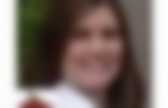

Effective group work « The Learning Spy. Just another example of effective groupwork OK.
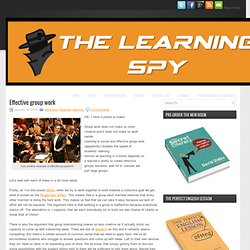
I have 3 points to make: Group work does not make us more creative and it does not make us work harder.Learning is social and effective group work (apparently) doubles the speed of students’ learning.Almost all teaching in schools depends on a teacher’s ability to create effective groups because, wait for it, classes are just large groups. Let’s deal with each of these in a bit more detail. Firstly, as I’ve discussed before, when we try to work together to work towards a collective goal we get, what is known as the Ringelmann Effect. There is also the argument that group brainstorming makes us less creative as it actually limits our capacity to come up with interesting ideas. Models for thinking: Memory is the residue of thought. What makes great teachers is great thinking.
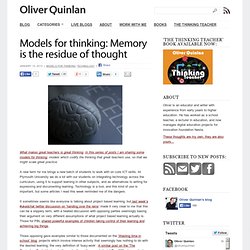
In this series of posts I am sharing some models for thinking; models which codify the thinking that great teachers use, so that we might scale great practice. A new term for me brings a new batch of students to work with on core ICT skills. At Plymouth University we do a lot with our students on integrating technology across the curriculum, using it to support learning in other subjects, and as alternatives to writing for expressing and documenting learning. Technology is a tool, and this kind of use is important, but some articles I read this week reminded me of the dangers.
Amanda Ripley's Intriguing Talk On Education Reform. I came across the video above from Amanda Ripley's talk at Pop Tech 2012 on Scott McLeod's Blog.
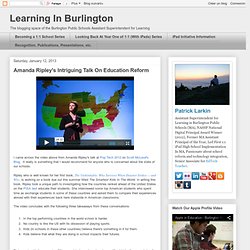
It really is something that I would recommend for anyone who is concerned about the state of our schools. Ripley who is well known for her first book, The Unthinkable: Who Survives When Disaster Strikes — and Why, is working on a book due out this summer titled The Smartest Kids In The World. In writing this book, Ripley took a unique path to investigating how the countries ranked ahead of the United States on the PISA test educate their students. She interviewed some top American students who spent time as exchange students in some of these countries and asked them to compare their experiences abroad with their experiences back here stateside in American classrooms.
We're Already Doing a Good Job! We are doing a good job at my school, and sometimes sharing ideas for change and betterment makes people angry?
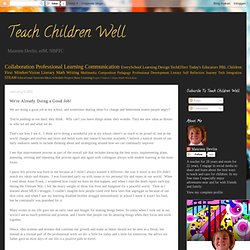
You're pushing us too hard, they think. Why can't you leave things alone, they wonder. Rigorous Assessment, by Design « Education Is My Life. Kristen Swanson is a founder of the Edcamp movement, and she serves on the board of the Edcamp Foundation.
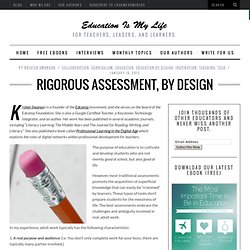
She is also a Google Certified Teacher, a Keystones Technology Integrator, and an author. Her work has been published in several academic journals, including “Literacy Learning: The Middle Years and The Journal for Reading, Writing, and Literacy”. She also published a book called Professional Learning in the Digital Age which explores the roles of digital networks within professional development for teachers.
The purpose of education is to cultivate and develop students who are not merely good at school, but also good at life. However, most traditional assessments promote the acquisition of superficial knowledge that can easily be “crammed” by learners. Be Better: Rethinking Feedback « Models By Design. World History Lessons. The Worst Consequence of Your Best Ideas. [I've talked about this idea a lot, but I wanted to actually put down both the reasons and some of the pathways to do this down in writing.
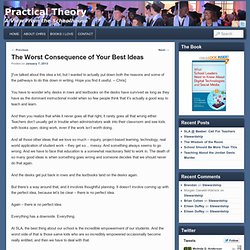
Hope you find it useful. -- Chris] You have to wonder why desks in rows and textbooks on the desks have survived as long as they have as the dominant instructional model when so few people think that it’s actually a good way to teach and learn. And then you realize that while it never goes all that right, it rarely goes all that wrong either. Teachers don’t usually get in trouble when administrators walk into their classroom and see kids with books open, doing work, even if the work isn’t worth doing. And all those other ideas that we love so much – inquiry, project-based learning, technology, real world application of student work – they get so… messy. And the desks get put back in rows and the textbooks land on the desks again. How to Allocate Your Time, and Your Effort - Elizabeth Grace Saunders. By Elizabeth Grace Saunders | 8:00 AM January 7, 2013 How does he find time to meet with 10 customers a week and make his yearly quota in the first quarter?

Get Real: The Key to Leadership. Reality Testing —your capacity to see things the way they are rather than the way you wish them to be—is one of the top key components of emotional intelligence (EQ) for effective leadership. And if you still think that EQ is the touchy-feely, unimportant side of leadership, get this: It’s more predictive of leadership success than IQ or experience. It counts. And I seem to be seeing less and less savvy Reality Testing in leaders, especially in connection with regard to implementing “initiatives”—new strategies or programs designed to bring about change.
Does the “school cliff” matter more than the fiscal cliff? For all the yammering about the fiscal cliff, another cliff might present a more perilous danger — what the folks at Gallup call the “school cliff.”
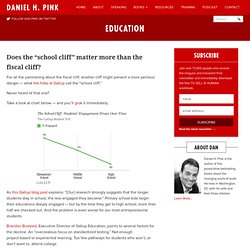
Never heard of that one? Take a look at chart below — and you’ll grok it immediately. As this Gallup blog post explains: “[Our] research strongly suggests that the longer students stay in school, the less engaged they become.” “Knowing That” versus “Knowing How” In Just Six Short Years. Note: I've been sitting on this post for almost two months because it never felt like it was done.
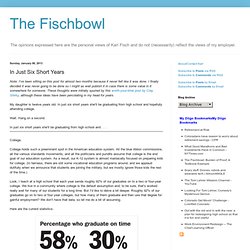
I finally decided it was never going to be done so I might as well publish it in case there is some value in it somewhere for someone. These thoughts were initially spurred by this worth-your-time post by Clay Shirky, although these ideas have been percolating in my head for years. My daughter is twelve years old. In just six short years she'll be graduating from high school and hopefully attending college.
Wait. In just six short years she'll be graduating from high school and . . . College. “Design Thinking” & Classroom Reality. Tonight’s Sixty Minutes program has an interview with David Kelley, known for “design thinking,” which “refers to incorporating human behavior into design.”
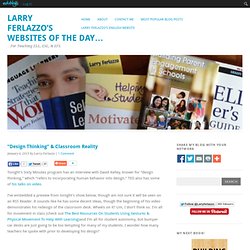
TED also has some of his talks on video. I’ve embedded a preview from tonight’s show below, though am not sure it will be seen on an RSS Reader. It sounds like he has some decent ideas, though the beginning of his video demonstrates his redesign of the classroom desk. Be Better: Feedback from Students « Models By Design. As promised in my previous post, “Be Better,” I’m going to highlight a handful of the ways we individual educators can take our own initiative to improve our craft. This week, that way is by feedback. There are two kinds of feedback that I think are valuable to every educator: feedback from students, and feedback from colleagues (peers and admin); today I’ll post some ideas on student feedback for teachers.
Kristenswanson : Transfer Tchart #ubdchat... Kristenswanson : Commit to the verbs of... Kristenswanson : Locus of control and design... Kristenswanson : 3 Big Ideas of UbD #ubdchat... Kristenswanson : Design challenge #ubdchat... Model Curriculum Units. Kristenswanson : #ToledoLearn at work! #ubdchat... Why can’t I learn Spanish? « The World as a Classroom.
Okay I am not an expert at language. I don’t know the “crucial points” for acquiring language, nor do I know the best strategies for learning a language. But something I do know is that I cannot seem to learn Spanish even though I want to so badly. Learning a new language, I feel opens up a new way of thinking, it opens up an entire new set of people to communicate and to try and understand. People with other ways of seeing the world, other histories, other stories, other views, could all be sources of new ideas if I could just learn Spanish. Of course I’m assuming anyone from Latin America or Spain would actually want to talk to me. . . but for argument’s sake, lets say they would. When I am in Spanish class, I am never engaged. Language is such a beautiful thing and opens up worlds to people.
Lets discuss issues in Spanish, Lets listen to speeches in Spanish. Language should be something to understand not facts to regurgitate on a test. Ten Things I Notice When Playing My Students’ Video Games. (If you have been following my blog lately, you know we are towards the end of our video game design unit. I’ve been playing — assessing — games over the holiday break. I’ve seen some pretty amazing games, and played some pretty poorly-designed games, and everything in-between. Here are some things that come to mind — in a sort of stream-of-consciousness way. I don’t mean for them to be negative, but I have found myself being critical of the projects. Test Kitchen. What’s your library like? If it’s like most school libraries, that’s a pretty obvious answer -books, tables, circulation desk, some reference stations, a computer lab or two – you get the picture. 2012: The Year in Graphs.
As 2012 draws to a close, Wonkblog asked our favorite professional wonks — economists, political scientist, politicians and more — to see what graphs and charts they felt did the best job explaining the past year. RSA Animate - The Power of Outrospection. Why It's Time to Eliminate Class Schedules. I spend a lot of time in a philosophical tug-of-war with students and parents over what grades mean, why we give them, and how they should be interpreted. Parents want to know how their child is doing, students want to be left alone, and teachers just want everyone to think a bit more critically about the material. Know your harbor SmartBlogs. Many teachers beginning the process of deep curriculum work or practice/teaching transformations start in zones of comfort. This Year’s “What If?” History Lesson. Q&A: Students Appreciate Proficiency-Based Learning, Says Coach - Getting Smart by Sarah Cargill -
Email Share December 26, 2012 - by Sarah Cargill. Common Core Toolkit for Principals: Part 1. What Do Students Really Need to “Know?" Now, This Is Creative: A Choose Your Own Fiscal Cliff Adventure. To Give Your Employees Meaning, Start With Mission - Teresa Amabile and Steve Kramer - HBS Faculty. By Teresa Amabile and Steve Kramer | 11:00 AM December 19, 2012. Authentic Education - Upcoming Events. Drilling Down to The Skill. Emergent learning: the designer’s role, the learner’s experience. Kid Snippets: "Math Class" (Kids Tell, Adults Act) Noncognitive%20Report. Three Problems with School « The World as a Classroom. Snapshot of a Deeper Learning Classroom: Aligning TED Talks to the Four Cs. Video - What Did We Search for This Year? In a Change Effort, Start with the Last Mile - Ron Ashkenas.
The odd correlation between SES and achievement: why haven’t more critical questions been asked? A call to action. Graphing Stories. Am I a Legitimate Voice? « JustinStrudler. Math as artistry: an interview with Steve Strogatz, mathematician. Is that story about me? Latino children, books, and literacy.
Most Influential Education Blog Post of 2012. I Can Common Core Standards for K – 5. Ed Tech Notes. Photo by davidjakes. Beyond the Bubble. 10 Tips on Writing from David Ogilvy. Questioning Toolkit. Scaffolding for Deeper Understanding. A mistake is a moment in time by Jason Fried of 37signals. How do you plan? On templates and instructional planning. 10 year old intellect, Dalton Sherman's keynote speech. Common Core: Now What?:The Common Core Ate My Baby and Other Urban Legends. Ideas Into Action. Testing Consortium Crafts College-Readiness Definition - Curriculum Matters. Kane. How do you plan? How Do We Measure a Competency? « Principal Greg Miller.
Teaching about Thanksgiving in a multicultural society. Empower Their Voice. Day 2 Training Resource: Common Core Whitepaper. Kassandraboyd : Without "vision" there cannot... Math Project: Disneyland Parking Structure. Answering Essential Questions (in our Sketch-Reflection Journals) Harvard Education Letter. Granted, but… Questioning – Top Ten Strategies. Spend Time Talking About Learning. Focus on cSHED to Challenge Students Meaningfully.